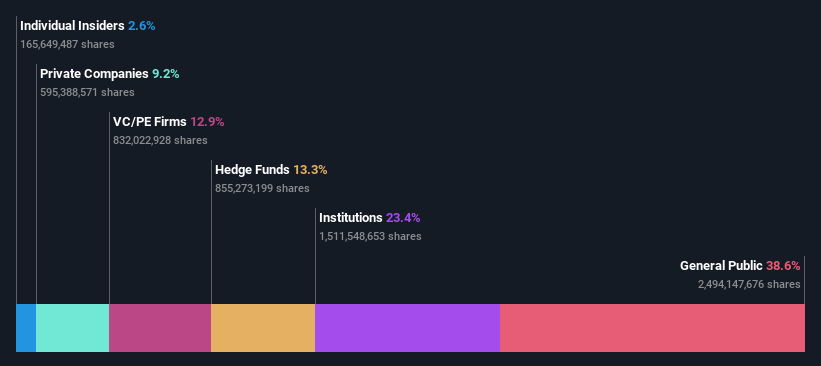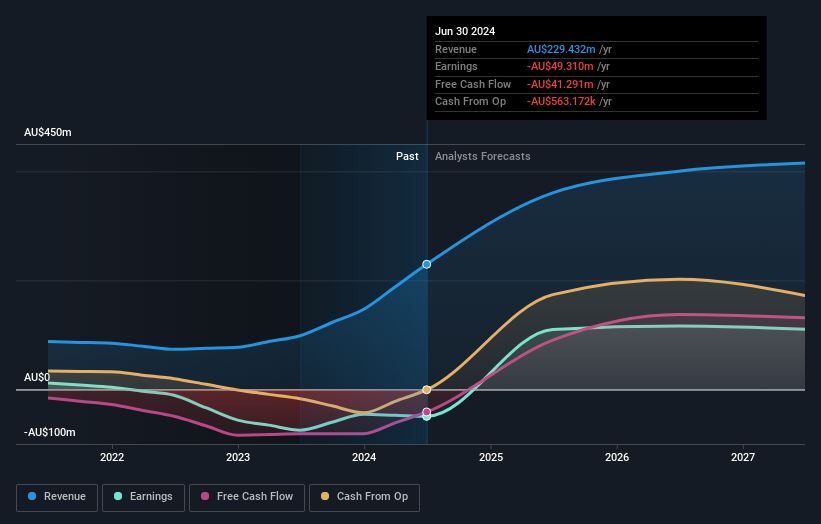- Australia
- /
- Metals and Mining
- /
- ASX:PNR
Painful week for individual investors invested in Pantoro Limited (ASX:PNR) after 11% drop, institutions also suffered losses

Key Insights
- Significant control over Pantoro by individual investors implies that the general public has more power to influence management and governance-related decisions
- 52% of the business is held by the top 8 shareholders
- Institutions own 23% of Pantoro
If you want to know who really controls Pantoro Limited (ASX:PNR), then you'll have to look at the makeup of its share registry. And the group that holds the biggest piece of the pie are individual investors with 39% ownership. Put another way, the group faces the maximum upside potential (or downside risk).
Following a 11% decrease in the stock price last week, individual investors suffered the most losses, but institutions who own 23% stock also took a hit.
Let's delve deeper into each type of owner of Pantoro, beginning with the chart below.
View our latest analysis for Pantoro

What Does The Institutional Ownership Tell Us About Pantoro?
Institutional investors commonly compare their own returns to the returns of a commonly followed index. So they generally do consider buying larger companies that are included in the relevant benchmark index.
We can see that Pantoro does have institutional investors; and they hold a good portion of the company's stock. This implies the analysts working for those institutions have looked at the stock and they like it. But just like anyone else, they could be wrong. It is not uncommon to see a big share price drop if two large institutional investors try to sell out of a stock at the same time. So it is worth checking the past earnings trajectory of Pantoro, (below). Of course, keep in mind that there are other factors to consider, too.

Our data indicates that hedge funds own 13% of Pantoro. That worth noting, since hedge funds are often quite active investors, who may try to influence management. Many want to see value creation (and a higher share price) in the short term or medium term. The company's largest shareholder is Regal Partners Limited, with ownership of 13%. With 13% and 7.5% of the shares outstanding respectively, Tulla Resources Group Pty Limited and Franklin Resources, Inc. are the second and third largest shareholders.
On further inspection, we found that more than half the company's shares are owned by the top 8 shareholders, suggesting that the interests of the larger shareholders are balanced out to an extent by the smaller ones.
Researching institutional ownership is a good way to gauge and filter a stock's expected performance. The same can be achieved by studying analyst sentiments. Quite a few analysts cover the stock, so you could look into forecast growth quite easily.
Insider Ownership Of Pantoro
The definition of company insiders can be subjective and does vary between jurisdictions. Our data reflects individual insiders, capturing board members at the very least. Company management run the business, but the CEO will answer to the board, even if he or she is a member of it.
I generally consider insider ownership to be a good thing. However, on some occasions it makes it more difficult for other shareholders to hold the board accountable for decisions.
We can report that insiders do own shares in Pantoro Limited. It has a market capitalization of just AU$574m, and insiders have AU$15m worth of shares, in their own names. It is good to see some investment by insiders, but it might be worth checking if those insiders have been buying.
General Public Ownership
The general public-- including retail investors -- own 39% stake in the company, and hence can't easily be ignored. This size of ownership, while considerable, may not be enough to change company policy if the decision is not in sync with other large shareholders.
Private Equity Ownership
With a stake of 13%, private equity firms could influence the Pantoro board. Sometimes we see private equity stick around for the long term, but generally speaking they have a shorter investment horizon and -- as the name suggests -- don't invest in public companies much. After some time they may look to sell and redeploy capital elsewhere.
Private Company Ownership
It seems that Private Companies own 9.2%, of the Pantoro stock. It might be worth looking deeper into this. If related parties, such as insiders, have an interest in one of these private companies, that should be disclosed in the annual report. Private companies may also have a strategic interest in the company.
Next Steps:
I find it very interesting to look at who exactly owns a company. But to truly gain insight, we need to consider other information, too. For example, we've discovered 1 warning sign for Pantoro that you should be aware of before investing here.
If you would prefer discover what analysts are predicting in terms of future growth, do not miss this free report on analyst forecasts.
NB: Figures in this article are calculated using data from the last twelve months, which refer to the 12-month period ending on the last date of the month the financial statement is dated. This may not be consistent with full year annual report figures.
New: Manage All Your Stock Portfolios in One Place
We've created the ultimate portfolio companion for stock investors, and it's free.
• Connect an unlimited number of Portfolios and see your total in one currency
• Be alerted to new Warning Signs or Risks via email or mobile
• Track the Fair Value of your stocks
Have feedback on this article? Concerned about the content? Get in touch with us directly. Alternatively, email editorial-team (at) simplywallst.com.
This article by Simply Wall St is general in nature. We provide commentary based on historical data and analyst forecasts only using an unbiased methodology and our articles are not intended to be financial advice. It does not constitute a recommendation to buy or sell any stock, and does not take account of your objectives, or your financial situation. We aim to bring you long-term focused analysis driven by fundamental data. Note that our analysis may not factor in the latest price-sensitive company announcements or qualitative material. Simply Wall St has no position in any stocks mentioned.
About ASX:PNR
Pantoro
Engages in the gold mining, processing, and exploration activities in Western Australia.
Reasonable growth potential with adequate balance sheet.
Similar Companies
Market Insights
Community Narratives



